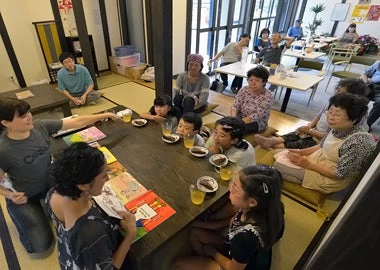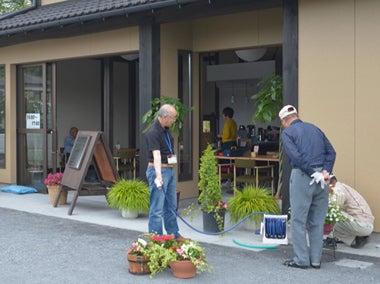
The World Bank Social Develpment department’s upcoming report. Inclusion Matters: The Foundation for Shared Prosperity, details the impacts of social exclusion on people’s well-being and on society overall. Unfortunately, aging is typically viewed as decline, and our elders are often marginalized both socially and physically (in nursing homes or other institutions).
My own eyes were opened to this about a year ago, when I met Emi Kiyota, founder and president of Ibasho, an NGO that develops simple and low-cost solutions to integrate elders into their communities. Having worked on disasters and resilience for some time, I have always advocated for empowering women and marginalized groups to drive their recovery process. But I had to admit that I still listed older people as a “vulnerable group” to be cared for. After learning about Ibasho’s work, I invited Emi to share her experience with World Bank staff. She provided a beautiful example of the benefits of providing opportunities for older people to actively take part in disaster recovery and community development.
After the city of Ofunato, Japan, was devastated by the 2011 earthquake and tsunami, Emi talked to the community members and found that older people wanted to do something useful to help the community recover. With facilitation by Ibasho, Operation USA, and funding support from Honeywell Hometown Solutions, elders and other community leaders planned and built Ibasho Café, which now acts as a hub that is restoring the fabric of a community still badly damaged by the disaster.
While there is typically huge pressure to rebuild quickly after a major disaster, investing the time in a participatory, inclusive process was key for Ibasho café. In fact, the design process itself was a vehicle for community development which engaged elders in an active role. The Ibasho team and the community of Ofunato invested a year and a half in co-designing and planning the type of gathering place they wanted in their community and how it would function. The physical construction of the café took about six months. Here, the community drove the process as well. The building is a reconstructed farm house that was donated by a community member to honor the 8 family members she lost in the disaster. In renovating the space, community members wanted to respect local traditions as well as make it a modern and welcoming space to younger generations. The building preserves a number of traditional features, including the timber roof that only carpenters over 75 knew how to rebuild, and modern, Scandinavian style décor that younger community members desired.  Now up and running, the Ibasho Café (see photos, by Yasuhiro Tanaka) is an informal gathering place that brings the community together. All generations connect in the space, with children coming to read books in the English library, older people teaching young people how to make traditional foods, younger people helping elders navigate computer software, etc.
Now up and running, the Ibasho Café (see photos, by Yasuhiro Tanaka) is an informal gathering place that brings the community together. All generations connect in the space, with children coming to read books in the English library, older people teaching young people how to make traditional foods, younger people helping elders navigate computer software, etc.
With elders actively engaged in the operation of Ibasho café, the space is building social capital and resilience, while at the same time changing people’s mindsets about aging. By focusing on what people can do rather than what they can’t, Ibasho Café also includes people with physical and cognitive disabilities.
Today, more than 1 in 10 people are over 60 years old. By 2050, 1 in 5 people will be over 60, and 80 percent of these will be living in developing countries. Both industrialized and developing countries face the challenge of successfully addressing the aging boom. Dr. Alan Power, another participant in the seminar, pointed out that our current view of aging is not a financially sustainable model. If we continue to marginalize older people and treat them solely as a vulnerable group to be cared for, the demographics alone will bankrupt economies around the world.
Ibasho offers an economically and environmentally sustainable model that allows older people to remain part of the community and remain useful to others. Communities benefit from the wisdom and experience of their elders, which builds social capital and resilience. More importantly, it also allows people to contribute to the development of their communities and to live their lives in dignity.
On Oct. 9, join us live online for the launch of the social inclusion report, and share your thoughts on the power of inclusion in the comments below and using the hashtag #inclusionmatters.
[1] Ibasho is a Japanese term which means “a place where all people feel they belong and are accepted.”
Photos of Ibasho Café courtesy of Yasuhiro Tanaka


Join the Conversation